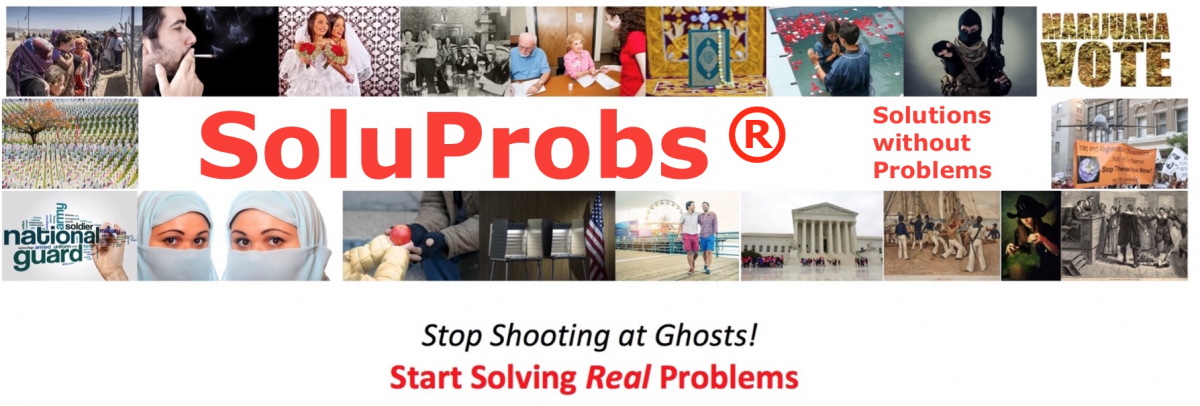Let me know what you think

From time to time, I will present some thoughts on Solutions without Problems (soluprobs) as a general phenomenon. For example, they often take the form of “Group Punishment.”
When I have said elsewhere that a problem doesn’t exist, that is sometimes a slight exaggeration. For example, Voter ID laws are designed to prevent in-person election fraud: pretending to be someone else, someone who is eleigible to vote. All the studies of this problem conclude that it is extremely rare, but it does happen in a few cases.
Similarly, a Michigan legislator proposed forcing foster chlldren to purchase clothes from thrift shops as a way of preventing foster parents from spending the children’s clothing allowance on booze. (I was never clear on the logic of that.) He never offered evidence as to how much clothing allowance was being boozed away or whether the problem really existed at all. But let’s be momentarily cyncial and assume it happens sometimes.
I’m going to go out on a limb and assume there were NO witches in Colonial Salem, but I think it’s fair to say that many of the other examples discussed on this website are solutions to problems that are RARE but may occur sometimes.
I would suggest there are two reasonable responses to problems that almost never happen.
Option One: ignore them. Life isn’t perfect. No matter how hard we try to prevent problems, a few slip through the cracks–and we survive.
Option Two: track down the specific instances of the rare problem and sanction them. If somebody tries to vote using someone else’s name, arrest them, try them, and put them in prison. If you discover foster parents spending the clothing allowance on booze, arrest them, try them, and put them in prison–at the very least, don’t let them be foster parents.
Make sense? Of course. More commonly, however, when we sense that a problem exists, we establish a “solution” that applies to everyone, the few wrongdoers and the great majority of straight arrows. Everyone has to get a Voter ID card, the vast majority of whom are eligible voters who have never cheated at the polls. What’s the likely impact of this group punishment?
Those who were doing nothing wrong are suddenly burdened with sanctions they don’t deserve. All those foster parents who spent the kids’ clothing allowance on, well, clothing for the kids now face limits on how to do their jobs. They probably have to fill out forms and jump through other hoops. Moreover, they will know that those in government assume they are misusing the funds, when they have been doing nothing but good.
How about those few wrong-doers? Do you think there’s any chance they’ll figure out a way to get around the new rules? Maybe they’ll forge receipts, find thrift store employees who’ll look the other way, etc. Officials who are busy applying the rules to all the innocent foster parents will probably miss the few bad apples.
All this can be avoided easily. Before taking action, measure the problem. See if it’s big enough to deserve a one-size-fits-all solution. If it’s not all that big a problem, ignore it or deal with the few cases that do exist. Don’t punish all the people who are playing by the rules.
© Earl Babbie 2016, all rights reserved Terms of Service/Privacy

An obvious example: drug testing of those on state-level assistance. States (like Missouri) who’ve implemented this “solution” to a non-existent problem discovered how non-existent it was when they actually measured the extent of the “problem” and their own data showed minuscule percentages of people using drugs who were also receiving state aid. Group punishment to the max!
Yes, that’s on my list as a soluprob to post fairly soon. I love the high percentage of the public who feel public office-holders should be tested for drugs.
This is very, very good. Years ago I worked on SRO housing in Chicago. Often these places had an exrensive set of house rules. There had been one incident, never repeated, but the response became enshrined, and everybody from then on had to be restricted. After a while it built into a formidable list.
Sounds like a soluprob to me.
Wonderful perspective. In concert:
Voter fraud is already illegal. Enforce the laws already there.
Fraudulent use of public benefits is already illegal. Enforce the laws already there.
Imagine extending this to real, large-scale problems where there is currently no meaningful punishment or enforcement. For example:
False advertising is against the law, a fraud. Arrest and imprison* Cigarette manufacturers, many big-Pharma executives, people who sell wars and send people to die under false pretenses, car manufacturers who conceal known mechanical dangers, financial institutions that offer fraudulent investment instruments that will harm whole segments of society, all examples of fraud.
Maybe it would be better for society if the people committing big frauds day-in-and-day out were prosecuted and imprisoned more aggressively (sometimes the very people making laws), than spending time and money finding ways to create new laws and enforce them for things whose impact on society is so negligible as to be nearly non-existent, but the laws themselves have enormous painful costs and consequences for huge numbers of innocent people; i.e. SoluProbs.
*Note: One can argue these big frauds are already prosecuted. But not really. Most are only subject to fines that in the end have been no more than a business expense. The key perpetrators, acting with malice of forethought, remain rich, rather than rotting in prison. In the case of people selling wars under false pretenses that have costs nations trillions, and resulted in the deaths, suffering and impoverishment of millions, some have retired to Texas and taken up painting as a hobby.
Meanwhile, entire legislative bodies are engaged in heated battles with high-moral stakes ensuring that, no matter what it takes, they will save us from a transgendered person inflicting God knows what horrors on who by virtue of going to the bathroom.
Well done Dr. Babbie. In my workplace we often write emails “To:All” to deal with a problem that happens rarely instead of confronting the wrong doer. Even gentle confrontations about mundane activities are difficult for some people.